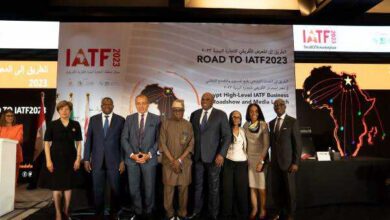IMF Warns Nigeria Against eNaira, Says it’ll Help Money Laundering, Finance Terrorism

By Paul Michael
The International Monetary Fund (IMF) has warned that the Nigerian eNaira will increase money laundering and help in financing terrorism.
Though IMF recognised the benefits of the Central Bank Digital Currency (CBDC) launched by Nigeria in October 2021, the body listed some risks similar to cryptocurrency.
In its staff country report titled ‘Nigeria: 2021 Article IV Consultation’, IMF stated that new activities related to money laundering and terrorism financing will spring up should the CBN deploy eNaira for cross-border fund transfers and agency bank networks.
“Prospective expansion of eNaira use to cross-border fund transfers and agency bank networks may cause new money laundering/financing of terrorism (ML/FT) risks”, the report stated.
Read also: Customs Uncover N78.8m Codeine Imported Via Apapa Port
IMF also asserted that operational risk, such as legal issues between wallet providers and CBDC holders, might trail the usage of eNaira, which is still struggling to appeal to person-to-merchant or merchant-to-person.
“Unforeseen legal issues, including for private law aspects of its operations (e.g., the exact nature of legal relationship between the wallet providers and CBDC holders), may subject eNaira to litigation and operational risks.
“There are financial integrity risks which are mitigated by using a tiered identity verification system and applying more stringent controls to relatively less verified users,” the report added.
IMF further suggested that risk-sensitive mitigation measures should be prioritised by Nigeria’s central bank relating to money laundering/terrorist financing risk.
“Staff welcomed the gradual rollout of the CBDC and highlighted the need for vigilance to various risks, including for monetary policy implementation, bank funding, cyber security, operational resilience, and financial integrity and stability, through regular risk assessment and contingency planning,” the report adds.
“The eNaira offers low-cost and phone-enabled financial transactions outside established channels. This could potentially increase financial inclusion over time in rural areas and help meet the authorities’ ambitious target to increase the share of financially included adults to 95 percent.
“While preventive measures and the planned AML/CFT regulations for eNaira intermediaries are welcome, a money laundering/terrorist financing risk assessment of domestic and cross-border uses of eNaira and the adoption and implementation of the regulation along with putting in place risk-sensitive mitigation measures should be a priority.
“Staff noted that a dynamic digital lending ecosystem dominated by fintech implies greater competition with traditional service providers but also raises consumer protection issues,” the IMF report said.




